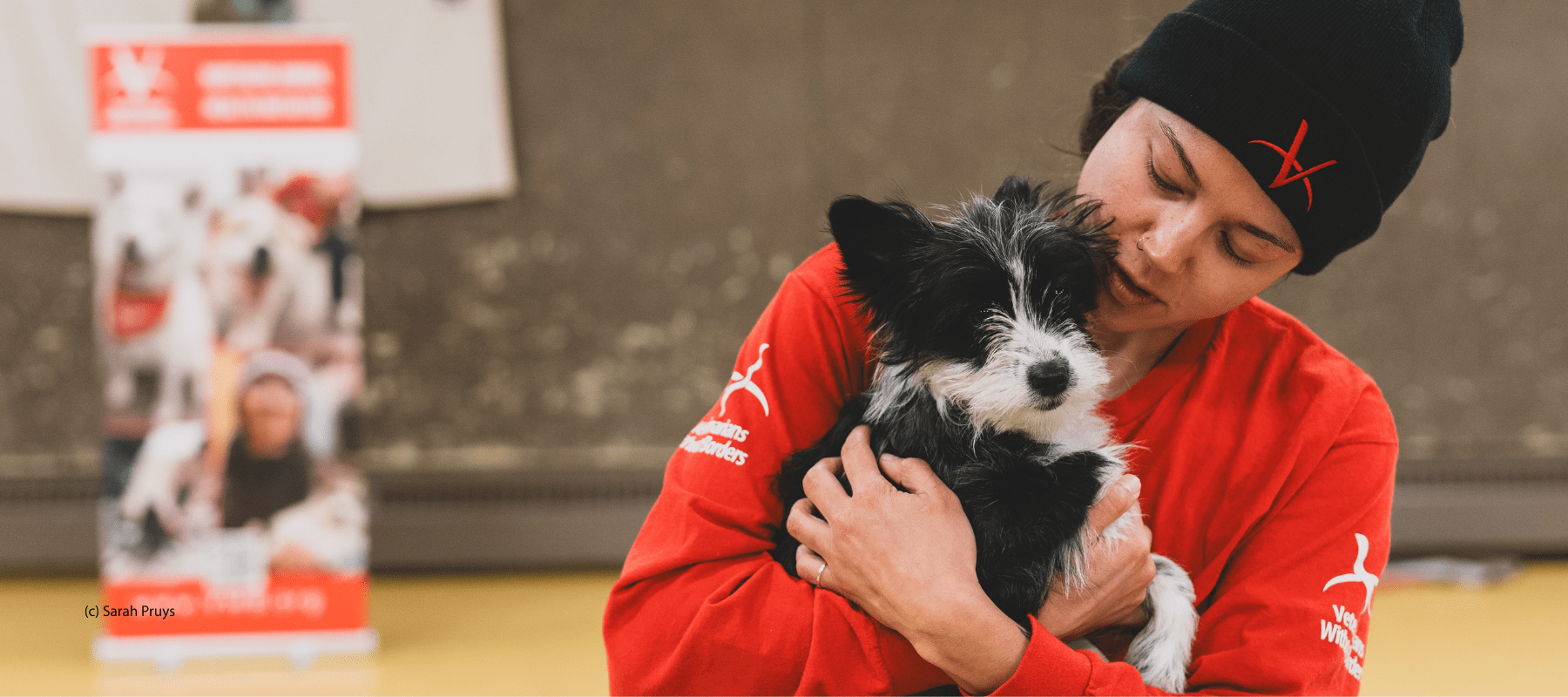This blog shares the story of Hannah (Tsai-Ping) Liao, a Master of Science student at the Ontario Veterinary College, and her recent trip to Gjoa Haven, Nunavut with Veterinarians Without Borders North America. It explores how community-based research and training are helping to improve access to animal health care in northern Canada. Grounded in a One Health approach, Hannah’s work highlights the power of collaboration between researchers, community members, and local leaders to build lasting, locally driven solutions.
This past May, Hannah (Tsai-Ping) Liao, a Master of Science student at the Ontario Veterinary College (OVC), traveled with the Veterinarians Without Borders North America (VWB) team to Gjoa Haven, Nunavut. Her visit marked the culmination of nearly two years of research focused on community-led veterinary care; a model that’s gaining traction as a sustainable solution to longstanding gaps in animal health services in remote and underserved areas.
Hannah’s thesis, part of her One Health specialization at OVC, examined Community Animal Health Worker (CAHW) programs—models that train local community members to deliver basic animal care. These programs are often used in low-resource settings around the world but are less commonly studied or adapted for northern or remote Canadian communities. That’s where Hannah’s work comes in.
“In the literature, there’s a knowledge gap around how these programs can function in the global North,” she explains. “Social and cultural contexts are different, the geography is different—so while the backbone of the CAHW model may be the same, the details have to be adapted with the community.” Integrating local knowledge is also critical to creating sustainable programs.
Program development
Working closely with the VWB team, including regular consultations with program staff and community leaders, Hannah designed her research to reflect a collaborative and grounded approach. She conducted 14 interviews with individuals engaged in animal health, both professionals and community members, and analyzed similar programs from around the world to inform her work. Her findings highlight the need for programs that build local capacity rather than rely solely on visiting teams or short-term outreach.
“It’s not sustainable when support only comes in for a few weeks at a time,” she notes. “But if it’s community-based and strengthens local ownership, the long-term outcomes are much more promising. Eventually, communities can build their own independent systems of veterinary care,” said Hannah.
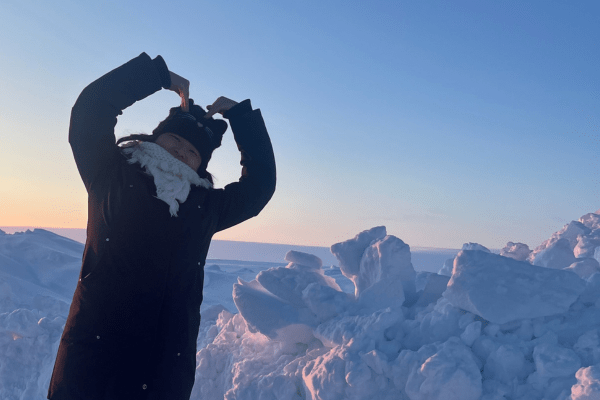 PHOTO: Hannah poses, overlooking the sweeping tundra in Gjoa Haven.
PHOTO: Hannah poses, overlooking the sweeping tundra in Gjoa Haven.
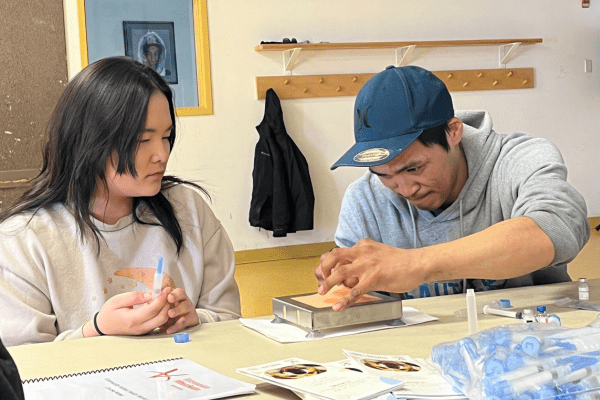 PHOTO: Hannah watches as Community Animal Health Worker, Jimmy, practices vaccinating animals.
PHOTO: Hannah watches as Community Animal Health Worker, Jimmy, practices vaccinating animals.
Community Animal Health Worker Training
That philosophy is at the heart of VWB’s Community Animal Health Worker training program, which recently launched in Gjoa Haven. The training equips local residents with the skills to provide first aid, administer vaccines like rabies, and support basic animal health—services that are vital in remote regions where veterinary professionals are few and far between.
Hannah shared her final research findings during a well-attended community event while visiting Gjoa Haven. With brochures developed specifically for the occasion, she made sure the presentation was accessible and engaging, especially for local elders.
“A lot of elders were nodding along and deeply engaged,” she recalls. “People here really understand the importance of these services, and how much they are needed.”
The connection between community members and their dogs left a lasting impression on Hannah. “The bond is strong,” she says. “One man gave me a hug just for making his dog a name tag. That kind of gratitude really shows how much people care and how meaningful this work is.”
“It’s not sustainable when support only comes in for a few weeks at a time,” she notes. “But if it’s community-based and strengthens local ownership, the long-term outcomes are much more promising. Eventually, communities can build their own independent systems of veterinary care.”
That philosophy is at the heart of VWB’s Community Animal Health Worker training program, which recently launched in Gjoa Haven. The training equips local residents with the skills to provide first aid, administer vaccines like rabies, and support basic animal health services, which are vital in remote regions where veterinary professionals are few and far between.
Sharing the research
Hannah shared her final research findings during a well-attended community event in Gjoa Haven. With brochures developed specifically for the occasion, she made sure the presentation was accessible and engaging, especially for local elders. “A lot of elders were nodding along and deeply engaged,” she recalls. “People here really understand the importance of these services—and how much they are needed.”
The connection between community members and their dogs left a lasting impression on Hannah. “The bond is strong,” she says. “One man gave me a hug just for making his dog a name tag. That kind of gratitude—it really shows how much people care and how meaningful this work is.”
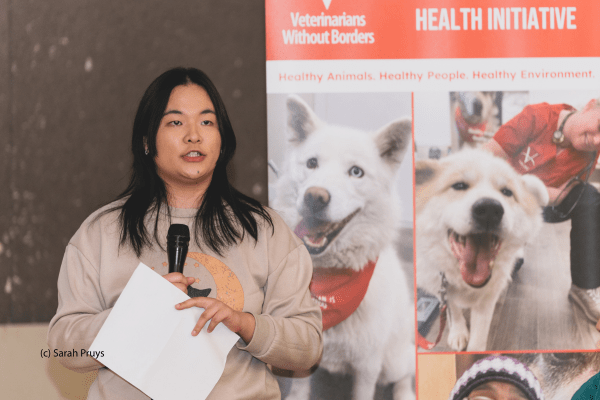 PHOTO: Hannah presents her research at a community event in Gjoa Haven.
PHOTO: Hannah presents her research at a community event in Gjoa Haven.
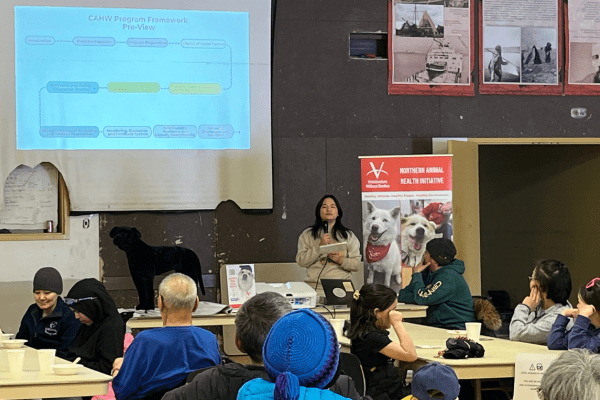 PHOTO: Hannah takes questions at the Gjoa Haven community event.
PHOTO: Hannah takes questions at the Gjoa Haven community event.
For VWB, supporting researchers like Hannah is a vital part of its One Health mission. One Health recognizes that the health of people, animals, and the environment are deeply interconnected, and that sustainable change must be community-led and culturally informed.
By backing students and early-career researchers, VWB helps advance this integrative approach, ensuring that future veterinarians, scientists, and policy leaders understand the importance of working collaboratively across disciplines and geographies.
Hannah’s journey is just one example of what’s possible when academic research meets grassroots action. As the demand for veterinary care continues to grow in northern and Indigenous communities, efforts like these are paving the way for a more equitable, locally driven model of animal health.
Learn more about VWB's work in Canada's remote North.

